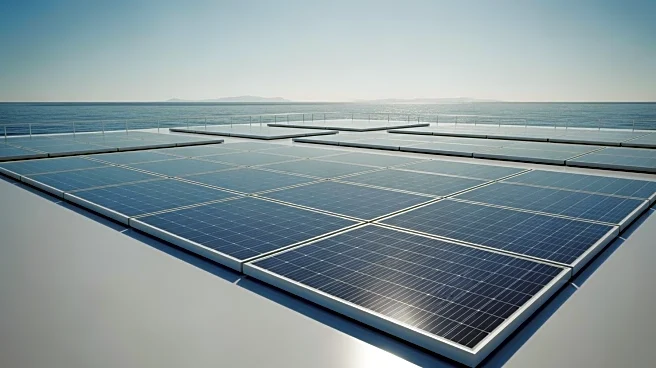What's Happening?
Dutch maritime solar company Wattlab has successfully installed a solar energy system on the Vertom Tula, a 7,280dwt diesel-electric multipurpose cargo vessel operated by Vertom. This installation marks a significant advancement in sustainable shipping
practices. The solar system, consisting of 44 Solar Flatracks, was installed in the Port of Harlingen and is designed to reduce the vessel's hotel load by 20%. The Solar Flatracks can be quickly installed using container twist lock fittings, allowing for easy removal and storage if necessary. This innovation is part of Vertom's broader strategy to reduce greenhouse gas and pollutant emissions across its fleet of over 100 vessels.
Why It's Important?
The installation of solar systems on cargo vessels like the Vertom Tula represents a critical step towards reducing the maritime industry's carbon footprint. As global shipping accounts for a significant portion of greenhouse gas emissions, innovations like Wattlab's Solar Flatracks offer a practical solution for reducing environmental impact. The ability to decrease emissions while maintaining operational efficiency is crucial for shipping companies facing increasing regulatory pressure to adopt greener practices. This development not only benefits the environment but also provides a potential return on investment for shipowners by reducing fuel costs and enhancing sustainability credentials.
What's Next?
Following the successful installation and testing of the Solar Flatracks, Vertom and Wattlab may explore further deployments across Vertom's fleet. The positive results from initial tests suggest that this technology could be expanded to other vessels, potentially setting a new standard for sustainable practices in the maritime industry. Additionally, as regulatory bodies continue to push for lower emissions, other shipping companies might adopt similar technologies, leading to broader industry changes.
Beyond the Headlines
The adoption of solar technology in shipping highlights a growing trend towards integrating renewable energy sources in traditionally fossil fuel-dependent industries. This shift not only addresses environmental concerns but also reflects a broader cultural change towards sustainability. The ease of installation and maintenance of the Solar Flatracks could encourage more companies to invest in similar technologies, potentially leading to significant long-term reductions in maritime emissions.















